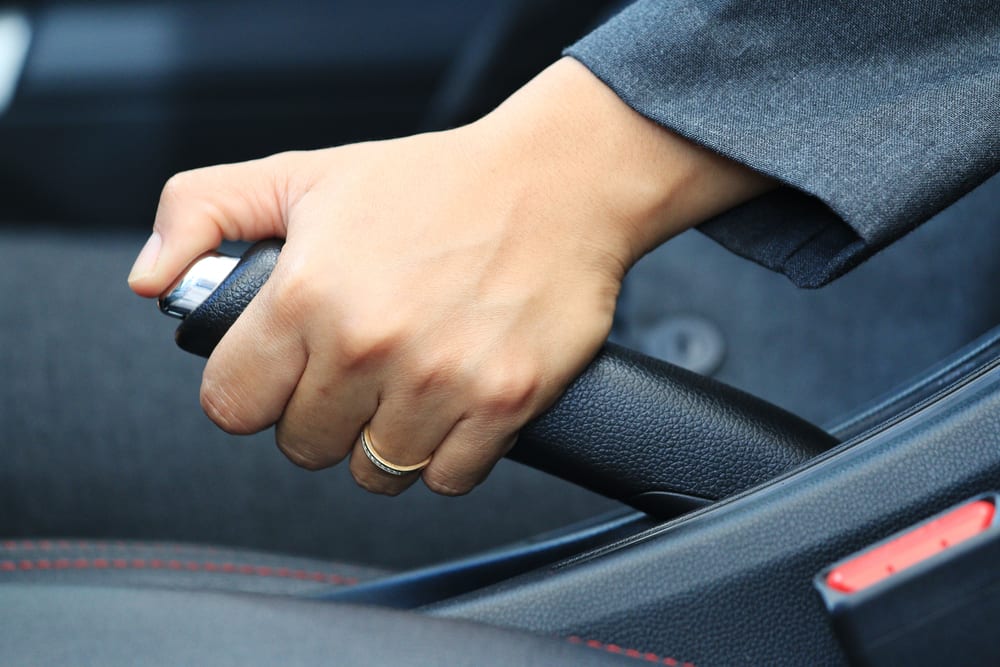

Leaving a parking brake on in a vehicle while driving is a common occurrence and an easy mistake to make, especially if you are driving in a vehicle you aren't used to. The first indication of a problem is a lack of power. And if the parking brake is left on for too long, you will begin to smell a distinct burning odor, which occurs when the brake pad gets too hot.
You might wonder if leaving the parking brake on while driving can damage your vehicle's brakes. The answer depends in part on the speed you were traveling when it was on, how long you drove with the parking brake engaged, and whether your vehicle is a front- or rear-wheel-drive vehicle.
Can driving with the parking brake on damage your brakes?
For the most part, leaving the parking brake on while driving does not cause any long-lasting problems when driving for a short distance or at minimal speeds. When you leave the parking brake on, it creates friction between the brake pad and the rotors. The faster you drive, the more heat the friction produces, potentially causing problems after an extended amount of time driving with the parking brake engaged.
Sometimes the heat produced gets transferred to the brake fluid, causing the brake fluid to boil in extreme situations. Most often, though, the heat produced just puts a glaze on the brake pads themselves, making the pads very slick and harder to stop your vehicle. Braking normally over a period of time should remove this glaze, allowing the brakes to work as they should.
Another factor that can play a part in whether your brakes become damaged from leaving the parking brake on while driving is how much the parking brake was applied. If it was lightly applied, or only a few clicks, then the brake pads should only suffer minimal damage, if any at all. If the parking brake was pushed all the way in, then your brakes might suffer more extensive damage.
The difference between front-and rear-wheel-drive vehicles
Depending on the type of drive system your vehicle has, a front or rear drive determines in large part whether a vehicle can even operate with the parking brake on. In a vehicle with a front wheel drive, the wheels might not even turn. If the vehicle does move, more than likely the tires should drag, making it obvious that you have a problem.
If you have a rear-wheel-drive vehicle, problems can develop when driving with the parking brake engaged. As is often the case, the engine can easily overpower the brakes in a rear-wheel-drive vehicle to the point that you don't even notice that there is a problem until it is too late. If allowed to remain engaged for too long, driving with the parking brake on can cause premature wear of brake components and could even lead to damage to the wheel bearing or a catastrophic failure of parts near or associated with the braking system.
How to tell if your brakes need replacement
You might have to replace your brakes if after disengaging your parking brake you notice the brakes feel spongy when applied. If the brakes continue to feel spongy, you should get the fluid checked to make sure it is still in good shape or that there is no air in the brake lines.
The brake pads could have also have been damaged, through the excessive heats involved, to the point where they need replacing. A sure sign of this is if you notice a pulsating or bouncing in the brake pedal when pressing it down. If this is the case, have the brake pads replaced to fix the problem.
Brakes wear normally over their lifespan, needing replacement at regular intervals. If you accidentally leave your parking brake on while driving, though, you could accelerate this wear to the point that your brake pads need replacement sooner or possibly immediately after driving with the parking brake on for long distances at high speeds. If this is the case, call on one of our expert mechanics to replace your brake pads for you.



